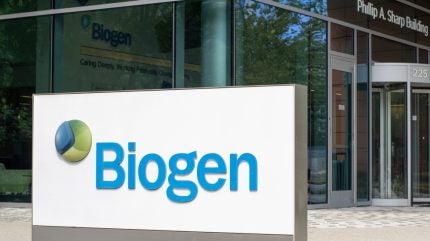
Biogen has unveiled Q1 2025 revenues above estimates, spurred by strong sales of rare disease assets amid a sales dropoff from its multiple sclerosis business.
Quarterly revenues for the neurological disease drugmaker were $2.43bn, above analyst group William Blair’s estimates of $2.3bn. The Q1 sales performance represents a 6% increase compared to the same period in 2024, with Biogen ramping up commercial duties for existing drugs and buying assets during that time.

Discover B2B Marketing That Performs
Combine business intelligence and editorial excellence to reach engaged professionals across 36 leading media platforms.
One of those assets is Skyclarys, a drug picked up in a $7.3bn acquisition of Reata Pharmaceuticals in September 2023. The treatment for the neurodegenerative disorder Friedreich’s ataxia generated revenue of $124m in Q1, a value that had already taken into account the impact seen in US sales due to Medicare discount dynamics.
Approved in the US, Europe, and UK, amongst others, Skyclarys has a high growth ceiling. GlobalData’s Pharma Intelligence Centre forecasts sales of $1.3bn by 2031.
GlobalData is the parent company of Pharmaceutical Technology.
Skyclarys is one of the drugs spurring a change of the guard in Biogen’s pipeline. The company is well known for its host of multiple sclerosis treatments, such as Vumerity (diroximel fumarate), Tysabri (natalizumab), and Avonex (interferon beta-1a). But, sales for these treatments have declined over the years as biosimilars entered the market. The company’s multiple sclerosis business shrank 11% in Q1 2025 compared to the same period last year.

US Tariffs are shifting - will you react or anticipate?
Don’t let policy changes catch you off guard. Stay proactive with real-time data and expert analysis.
By GlobalData“Biogen is really, a tale of two companies in my view. There’s one company which has been a multiple sclerosis company, and that portfolio, as you all know, has been gradually declining,” said Biogen’s CEO Chris Vibacher in a Q1 earnings call.
“But there’s a new Biogen emerging. And when I look at the rare disease business […] we actually have a commercial portfolio that we’re actively promoting that’s now gotten to be about 45% of our product revenue. And those products mostly have a very long runway to continue to grow,” Vibacher added.
Alongside Skyclarys, Biogen’s rare disease business is headed by spinal muscular atrophy treatment Spinraza (nusinersen). Spinraza generated global Q1 2025 sales of $423.9m, up from $341.3m in Q1 2024. This increase, coupled with the decline of Tysabri, meant Spinraza was Biogen’s best-selling drug in Q1 2025.
Leqembi’s “modest growth”
Another key part of Biogen’s business model is its Alzheimer’s segment, now solely headed by Leqembi (lecanemab) after the company discontinued Aduhelm (aducanumab) at the start of 2024.
Biogen splits revenue from Leqembi with co-developer Eisai equally, the latter reporting Q1 sales of $96m for the drug. The US, where Leqembi got a full approval in July 2023, accounted for $52m of those sales. Biogen has already secured key milestones for Leqembi this year. In January, the US Food and Drug Administration (FDA) approved maintenance dosing of Leqembi, a move expected to expand its market share. Then in April, the Leqembi was authorised for use in the European Union (EU).
Biogen said the Q1 sales for Leqembi represented “continued sequential growth.”
William Blair analyst Myles R. Minter said in a research note that: “Skyclarys had a strong quarter, but the commercial focus remains on Leqembi, which has seen only modest growth, in our view.”
In the mergers and acquisitions space, Biogen failed a $469m takeover bid of Sage Therapeutics in January.




